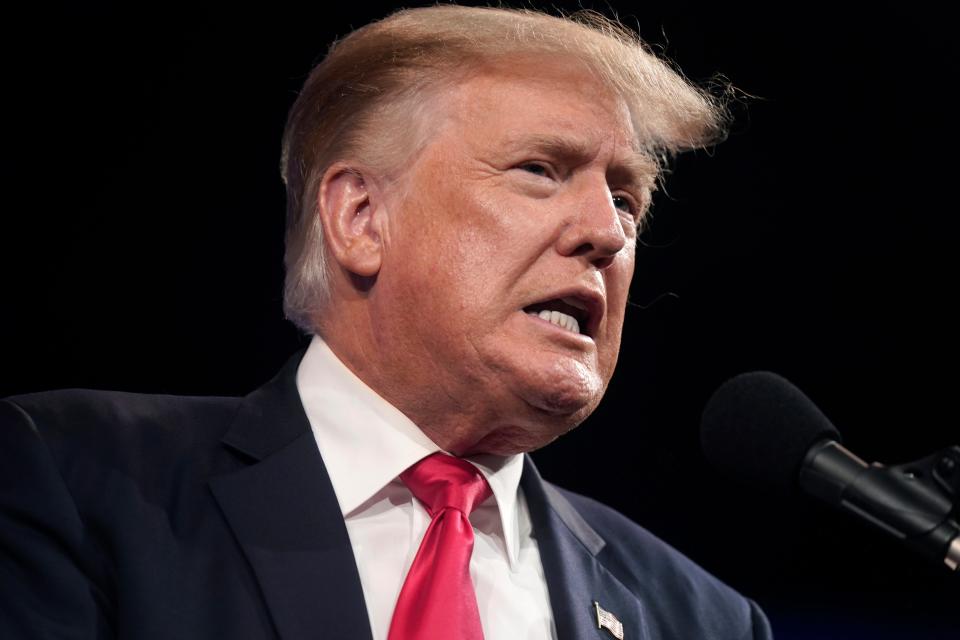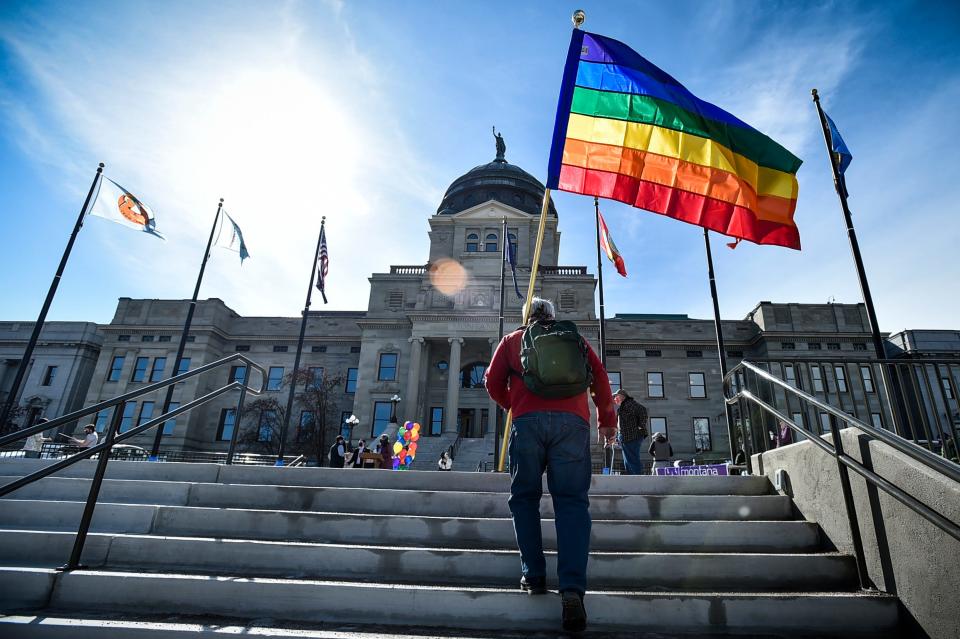LGBTQ mental health worsened during Trump presidency, studies say. The decline may not quickly reverse.
The LGBTQ community’s mental health suffered with Donald Trump's rise to the presidency, according to two studies measuring distress levels before and after the 2016 election.
Neither report says the former president caused the downturn or even tried to make such a determination, but Dr. Adrienne Grzenda, lead author of one study, said there’s a “fairly strong” correlation based on Trump's policies and rhetoric widely considered anti-LGBTQ.
And 94% of young LGBTQ people responding in late 2020 to a national survey said Trump-era politics had hurt their mental health, up from 76% who said the same in 2018, according to The Trevor Project, the largest suicide prevention and crisis services organization for young LGBTQ people.
The recently published studies cite a long list of anti-LGBTQ policies from Trump and his administration, which announced it would exclude questions about sexual orientation and gender identity from the 2020 census, rescinded a guidance that required schools to let transgender students use restrooms of their choice, and banned transgender people from serving in the military. Trump’s running mate, Vice President Mike Pence, had long been outspoken about his opposition to LGBTQ rights.
Video: How the LGBTQ community is still fighting for rights
"During the Trump administration, we saw at the federal level a number of policies and practices that restricted the rights of LGBTQ people," said Amy Green, vice president of research for The Trevor Project. "And we've seen an accumulation of evidence that points to those things being really harmful to the mental health of LGBTQ people."
Trump's election was especially jarring because he followed President Barack Obama, whose policies supported the LGBTQ community, said Rich Ferraro, chief communications officer for GLAAD, which advocates for LGBTQ acceptance and compiled a list of Trump anti-LGBTQ statements and policies.
"We watched the White House change from the Obama administration ending 'don't ask, don't tell,' passing marriage equality and lighting the White House in rainbow for Pride to watching rights backslide and having a president publicly stand against trans people and advocate … to allow businesses the right to discriminate against gay families," Ferraro said via email.
Data isn't yet available to determine whether the mental health slide is reversing during President Joe Biden's administration, which is seen as much more supportive of the LGBTQ community, the studies' authors said. Anti-LGBTQ state legislation, such as a Texas bill that would ban transgender students from competing in sports based on their gender identity, and the prospect of a 2024 Trump presidential candidacy may temper any psychological benefits offered by a Biden administration, Grzenda said.
Grzenda, assistant clinical professor of psychiatry and bio-behavioral sciences at UCLA, and medical colleagues sensed a pattern in their practices after Trump’s victory in 2016.
“Immediately following the election, we were all noticing this general increase in psychological distress amongst the LGBT community,” Grzenda said. “That didn’t go away immediately after that election."
Anecdotal reports of that despondency, which persisted during Trump's presidency, inspired an interest in statistical evidence. "We were very interested in seeing if there was a way to capture that distress” across the country, Grzenda said.

The study's analysis of more than 260,000 responses to a Behavioral Risk Factor Surveillance System survey in 2015 and 2018 found reports of "frequent mental distress" – at least 14 days in the past month – increased from 15.4% to 21.5% for sexual and gender minorities, also known as SGM people. In comparison, frequent mental distress rose from 10.4% to 11.5% for the cisgender, heterosexual population.
The conclusion of the study, published in the August/September issue of "LGBT Health," found “a clear association exists between the 2016 election and the changeover to a decisively anti-LGBT administration and the worsening mental health of SGM adults, although a completely causal relationship cannot be fully established.”
Within the LGBTQ community, mental health results were worse for transgender and bisexual people, the study said. Grzenda anticipated that transgender people might experience a greater level of distress than some others in the LGBTQ community because they were a frequent Trump target, but "the extent of it was quite surprising."
Legislation doesn't have to specifically target LGBTQ people to have a harmful effect, Grzenda said. Trump's failed effort to repeal the Affordable Care Act, which would have affected millions regardless of sexual orientation or gender identity, disproportionately threatened the physical and mental health of LGBTQ people who didn't have coverage before the act.
The health care law, known as Obamacare, "reduced the disparity in insurance" for LGBTQ people, and its repeal would have had an especially harmful effect on that community, Grzenda said.
"You cannot have one's health tied to politics. There cannot be politicization of public health, where individuals are worried based on what regime is in power whether or not they will have their benefits," Grzenda said.
A separate study by Arkansas Technical University associate professor Masanori Kuroki reviewed more than 1 million Behavioral Risk Factor Surveillance System respondents from 2014 through 2019. It found the gap in rates of “extreme mental distress” – major mental and emotional problems in all 30 of the past 30 days – more than doubled between LGBTQ Americans and the rest of the population, from 1.8% in 2014 and 2015, to 3.8% in early 2016, when Trump became the Republican presidential front-runner.
“The results indeed revealed a concerning rise in poor mental health among LGBT people after Trump’s presidency became a real possibility,” concludes Kuroki’s study, published online in June and scheduled to be published in the December issue of the journal Economics & Human Biology.
The prevalence of distress was more pronounced for LGBTQ people in states Trump won.
“Perhaps, extreme mental distress among LGBT people increased more in those states because they perceived anti-LGBT sentiments more often in the post-period,” the report says.
Kuroki’s research does not make any determination on whether Trump was the cause of the psychological downturn, just that it worsened at the time of his rise and election and grew over his term in the White House.
But given that LGBTQ people “overwhelmingly voted for” Democrat Hillary Clinton and “overwhelmingly perceived” the Trump administration and its supporters as anti-LGBTQ, “it is not far-fetched to say that Trump’s candidacy and presidency might have contributed to the mental health gap,” Kuroki said.

Other influences could be at play. "The rise of the extreme right is one of them. Political polarization in many ways can be (a) factor," Kuroki said. "Trump may be the symptom, not the cause, of what is hurting LGBT people’s mental health."
The Trevor Project is in the field gathering responses for its 2022 survey, which could show whether the arrival of the Biden administration reverses the mental health downturn. LGBTQ people have long experienced a higher level of stress because of discrimination and other societal pressures, The Trevor Project's Green said.
Just as anti-LGBTQ policies can hurt mental health, inclusive policies and practices can have a positive effect, Green said, noting a decline in LGBTQ youth suicide risk in states where same-sex marriage was approved ahead of the Supreme Court's ruling making marriage equality the law of the land in 2015. But the change in White House occupant is no guarantee of improvement.
"While there may be changes at the federal level, there are a lot of states in which (anti-LGBTQ) legislation, particularly anti-trans legislation, is being proposed," Green said. "If we think (that) if we just shift one person out of office that will change everything, we have to recognize that there are still things happening in court cases and legislation all around the country that are speaking to people."
Distress may be slow to decline because of "an ideology that can continue on without Trump," said Grzenda, noting the Jan. 6 U.S. Capitol insurrection and anti-LGBTQ state legislation. "We've certainly seen much of that ideology persists even without its figurehead in place."
Grzenda sees federal action, such as the passage of the Equality Act, with its proposed protections covering sexual orientation and gender identity, as a way to create a more secure environment for LGBTQ people. The Equality Act has passed in the Democratic-led House but has stalled in the Senate, where Democrats have a smaller majority.
"It is to some degree on the Biden administration to help put some of those federal protections in place to give people reassurance that these things will be there to help ensure their safety and their livelihood," Grzenda said. "But it is very difficult to say what the future is going to bring and certainly a very volatile time."
This article originally appeared on USA TODAY: LGBTQ people reported mental distress during Trump presidency

 Yahoo Movies
Yahoo Movies 
